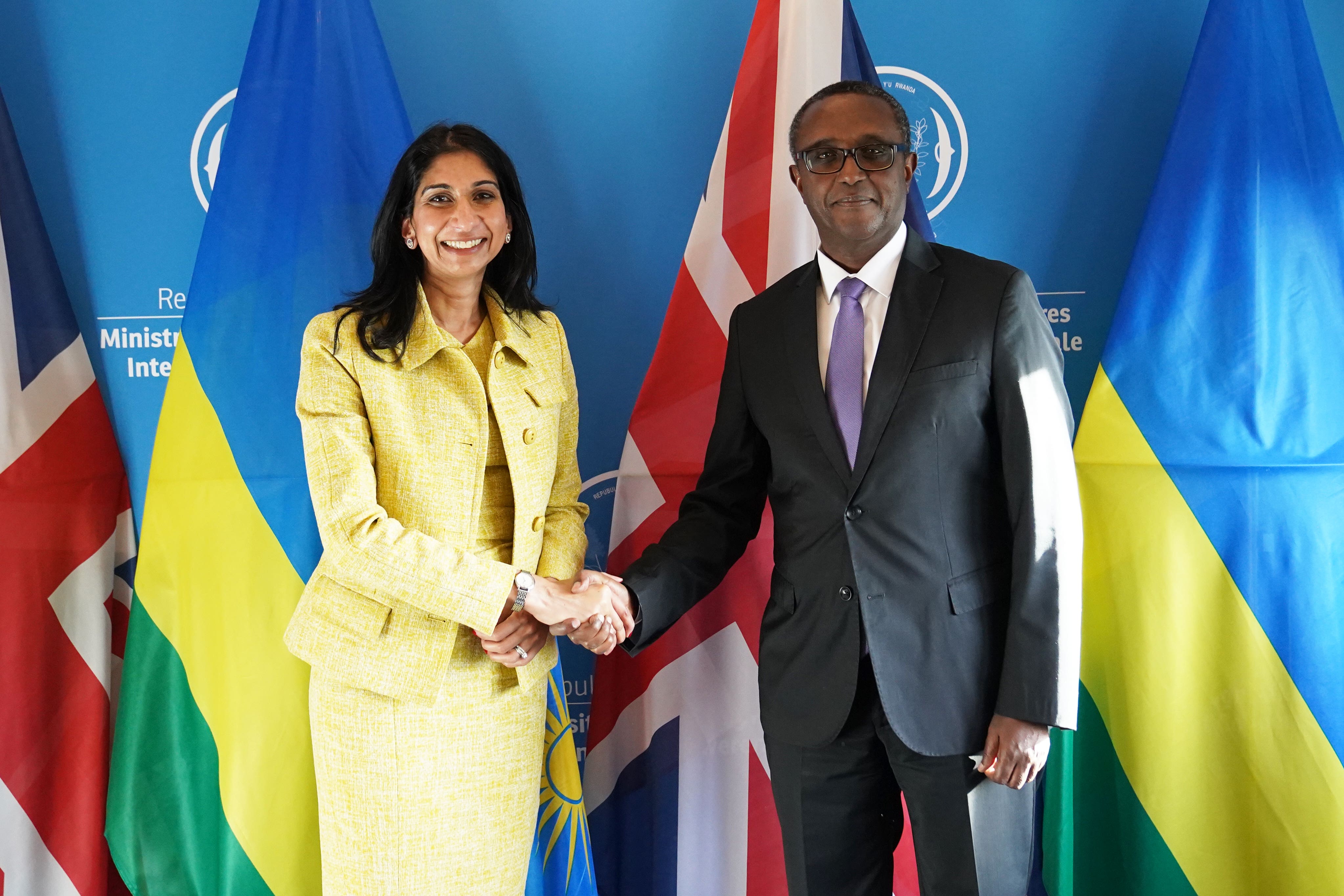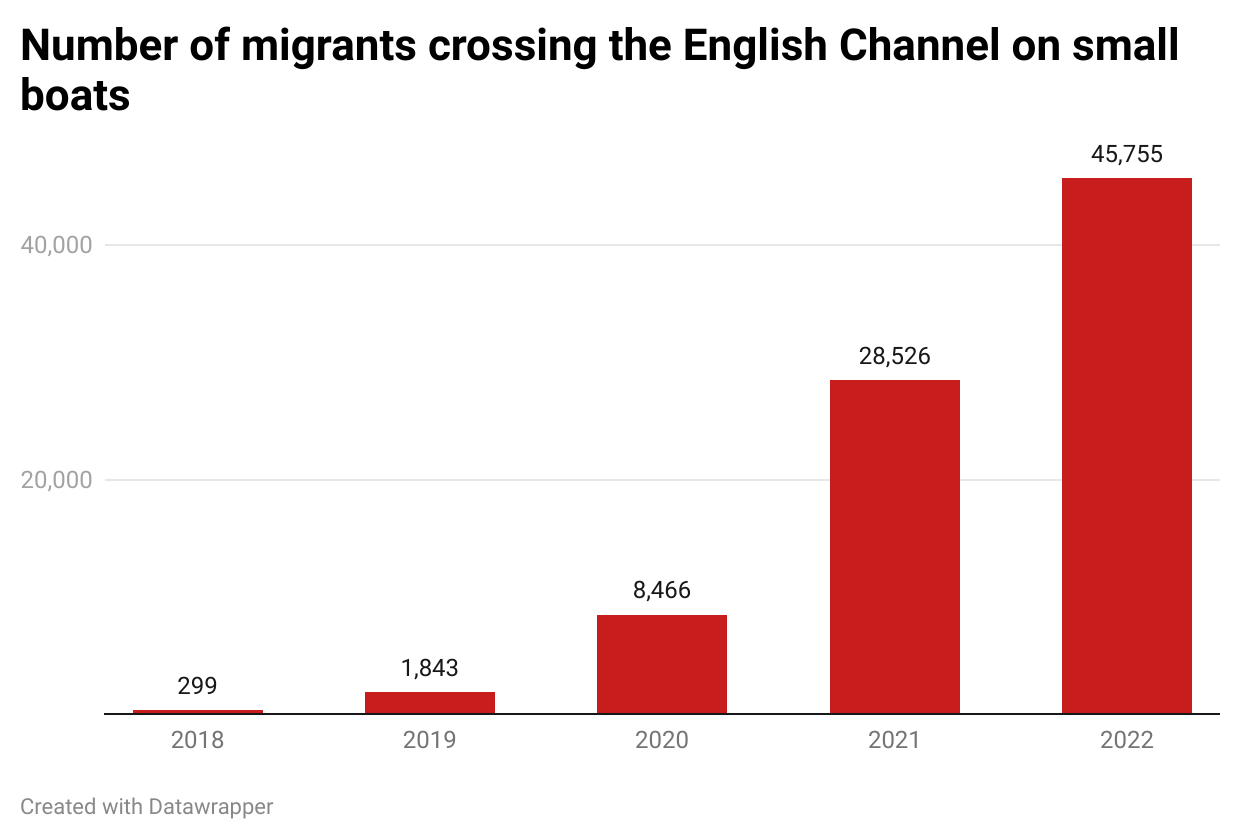Rwanda deal failing to deter small boat crossings with thousands making journey
Crossings running level to same point in record 2022 despite ministers’ claims of ‘deterrence’

The Rwanda deal is failing to deter asylum seekers from crossing the English Channel a year after it was signed, figures show.
Almost 5,000 people have made the journey so far in 2023, almost exactly the same figure seen by the same point in 2022.
No crossings have been made in the past two days because of rough seas and gales in the Channel, but arrivals are expected to rocket when the weather calms.
No flights have taken off since the former home secretary Priti Patel signed the agreement on 14 April 2022, and the government has not committed to a timetable as a legal battle over the scheme continues.
During a visit to Rwanda last month, Suella Braverman widened the deal beyond the asylum seekers initially targeted to include all small boat migrants, including modern slavery victims.
Ministers have repeatedly claimed the Migration and Economic Development Partnership would deter small boat crossings, but they soared to new highs last year.
The High Court ruled that the original agreement was lawful in December but quashed all deportation decisions for asylum seekers it considered.
Court of Appeal judges will reconsider its findings later this month, and whether Rwanda is a safe destination for asylum seekers.
Speaking to journalists on Thursday, Home Office minister Chris Philp said: “We are confident the policy is legal and as soon as we get the necessary legal clearance, we’ll implement it.
“I’m not going to get into timescales but we’re trying to move the legal process through the courts as fast as we possibly can.”
Asked if any asylum seekers would be deported by the second anniversary of the deal in 2024, a Home Office source said the government was “aiming” to get flights off the ground by that time and was “confident” it would happen.
Rishi Sunak has made “stopping the boats” one of his five main priorities but suggested the pledge would not be fulfilled by the next election.
In an interview with pro-Tory website Conservative Home, the prime minister said it “won’t happen overnight” and that he expects a fresh legal battle over the “novel, untested” Illegal Migration Bill, which seeks to detain and deport almost all small boat migrants without considering their asylum claims.
Britain paid Rwanda £120m in “development” funding on signing the deal and a further £20m for set-up costs, which could rise further.
Significant amounts of money have also been spent on the failed flight, legal costs, ministerial trips to the country and social media campaigns attempting to use the deal to deter migrants.
The government has committed to giving Rwanda an undisclosed amount for “the processing costs for each individual relocated, including caseworkers, access to legal advice, translators, accommodation, food, healthcare and, for those who are resettled, a comprehensive integration package including up to five years of training to help with integration”.
The UN Refugee Agency has said the agreement “undermines the established international refugee protection system”, risks the arbitrary denial of asylum and breaks international law.
Documents revealed in the High Court case showed that Rwanda had been “ruled out” of consideration for an asylum deal by the Foreign Office, but put back on the list of potential countries after “particular interest” was shown by Boris Johnson and Priti Patel.
Internal documents warned of “significant human rights concerns”, the recruitment of refugees for military operations, the torture, killing and kidnap of political dissidents, the 2018 shooting of refugees at a protest and a previous deal with Israel that saw asylum seekers disappear.

The Refugee Council said the “deeply disturbing and hugely expensive policy” was damaging the UK’s international reputation.
Tamsin Baxter, its executive director of external affairs, added: “The government has failed to produce any real evidence that the Rwanda plan would act as a deterrent to desperate men, women and children seeking safety in the UK. The truth is that so-called deterrence measures simply don’t work – they just push people to take even more dangerous journeys.”
Clare Moseley, founder of the Care4Calais charity, said the government should reduce demand for small boat crossings by offering safe passage to asylum seekers.
“Since the deal was signed, small boat crossings have reached a record high and we have seen the tragic loss of more lives in the Channel – proving this brutal policy will not end small boat crossings, it won't stop people smugglers and it won't keep refugees safe,” she added.
The Home Office said Channel crossings were putting strain on the UK’s asylum system, after backlogs hit a record high.
“Our priority is to stop this illegal trade, and our Small Boats Operational Command is working alongside our French partners and other agencies to disrupt the people smugglers,” a spokesperson added.
“The government has gone further by introducing legislation which will ensure that those people arriving in the UK illegally are detained and promptly removed to their country of origin or a safe third country.”






Join our commenting forum
Join thought-provoking conversations, follow other Independent readers and see their replies
Comments